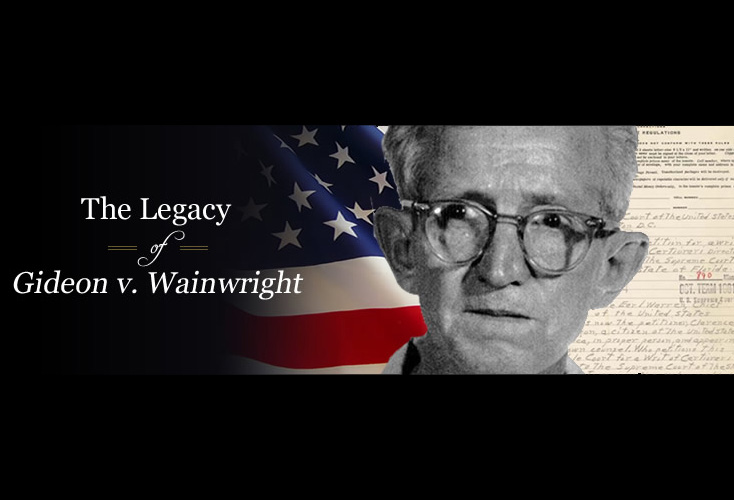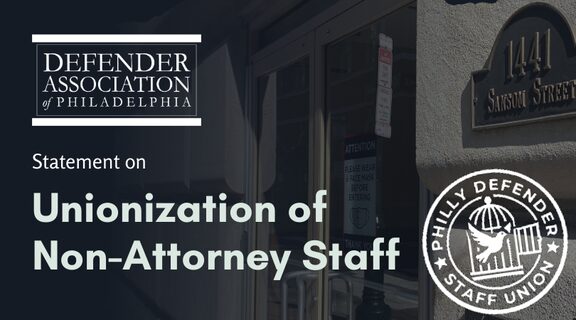Clarence Earl Gideon’s determination to seek justice in his own case led to justice for countless Americans through access to a public defender.
Each year, the anniversary of the Court’s March 18, 1963 release of its opinion on the case, provides a valuable opportunity to celebrate our work and reflect on its importance in an ever-evolving criminal justice system.
The Defender Association of Philadelphia’s history predates the Supreme Court’s 1963 ruling in the case of Gideon vs. Wainwright that “any person hauled into court, who is too poor to hire a lawyer, cannot be assured a fair trial unless counsel is provided for him.” But in the 56 years since Gideon guaranteed the right to counsel, we have made great strides in delivering on that promise.

Our defenders continue the tradition of zealous, client-centered representation while at the same time assuming a larger role in collaborative effort to reform the criminal justice system. As the community’s lawyers, the Defender Association’s insight and experience are critical to transforming the justice system into one that is fundamentally fair, effectively uses taxpayer dollars, and promotes public safety.
Commitment to True Reform
Defenders are the community’s lawyers, representing nearly 70 percent of all criminal cases in Philadelphia. This not only affords us the opportunity to protect due process rights for these people – but to identify areas of the justice process that too often fall short – and perpetuate mass incarceration and racial biases that plague our system.
Our experience not only helps us to understand these problems but to identify and advance solutions.
Reimagining our pretrial and probation and parole systems are essential to meaningful criminal justice reform.
Reimagining Pretrial Justice


Philadelphia’s jails are crowded with people who are imprisoned pretrial – in large part because of cash bail and probation detainers. The Defender is working with justice partners through the MacArthur Safety and Justice Challenge to reduce our jail population and the Defender is looking for additional system improvements that prevent people from becoming more desperate as they spend weeks or months in jail when they are presumed innocent.
Through the Early Bail Review program, a MacArthur-funded initiative, Defender attorneys team up with our bail navigators and client advocates to help people who were given cash bail they could not afford. Client advocate Evan Dubchansky spends most mornings in Philadelphia jails, listening to people’s stories and circumstances and developing a plan for them to be successful pretrial – outside of a jail cell. Evan then shares the notes with attorneys who represent clients at EBR hearings. Andrew Pappas, the Defender’s Assistant Chief of Municipal Court Pretrial Unit, conveys the information in a hearing before a judge that can often lead to the client going home to his or her community before trial.
Changing the Culture of “Mass Supervision”

In a city where one in 22 Philadelphians is on probation or parole, the Defenders’ Alternative Sentencing Unit works hard to support transparency and fairness. Nearly half of Philadelphia’s pretrial jail population sit in cells when a detainer is lodged for a possible violation of probation or parole. Until recently, hearings to challenge detainers happened without the participation of the person in jail. Working with justice partners, attorneys like Byron Cotter, Chief of the Defender’s Alternative Sentencing Unit and Assistant Chief Victoria Sanita, pushed for changes that now allow a person to participate in their detainer hearing remotely. This leads to more of the circumstances surrounding the possible violation to be considered and for more people to return to their communities pretrial.
Supporting Better Outcomes Through Client-Centered Legal Advocacy

The Defender Association’s hardworking team of attorneys, investigators, social workers, mitigators, and administrative professionals work inside and outside of court rooms to help our clients get fair outcomes in their cases. Our innovative training model, mentoring program, and zealous work in cases provide clients with high-quality representation and service. Defender attorneys like Thurgood Matthews, with decades of experience, advise and mentor new attorneys from every unit, helping to foster a sense of community and a wealth of collective information to help our clients. Learn more about Thurgood’s work here.
Making A Strong Case in Jury Trials

In early 2019, Defenders’ work resulted in more than 10 juries of Philadelphians returning verdicts of “not guilty,” allowing clients to receive the justice that Clarence Earl Gideon was initially denied more than a half century ago. Defenders like William Weiss, Alex DeSimone, Kenneth Williams, and Victoria Clark and others spend countless hours preparing cases to make sure that clients get the due process rights guaranteed to them in the Constitution.
Specialized Practice to Support All Clients

The Defender Association created a number of specialized practice units to support clients’ individual needs. Defender teams in our Children and Youth Justice, Juvenile Special Defense, Appeals, Prison Services, Alternative Sentencing, Special Defense, Homicide, and other units tailor their focus to provide high-quality representation. Luke Trama, an attorney in the Defender’s Mental Health Unit, represents clients with mental health concerns at every stage of the justice process. By working closely with his clients and learning their individual circumstances, stories, and challenges, Luke ensures that judges, district attorneys, and others see a complete picture of clients to prevent them from being harshly or unfairly punished.
Continuing Our Legacy with Community Support
Gideon v. Wainwright established the role of public defenders as a permanent part of the criminal justice system, but the Defender Association of Philadelphia continues to go above and beyond for clients and communities thanks to ongoing support from Philadelphia City Council members and City administration who recognize our value to the city. Each year, we seek new ways to protect the rights of our clients while helping to create a criminal justice system that is fundamentally fair, effectively uses tax dollars, and promotes the safety and strength of our communities.










